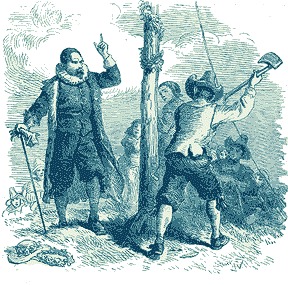The Doom-Ridden World of the Puritans
January 24, 2018

IN his short story, “The Maypole of Merry Mount,” published in 1832, Nathanael Hawthorne described the conflict between Puritan settlers of New England and those settlers, established at Mount Wollaston, also known as Merry Mount, who retained the ways of old England with its festivals and feasts.
Unfortunately, the culture of the Puritans, who sent the Merry Mounters packing, would ultimately triumph in New England, leading to the grim political creeds we see today, at their core Puritanical even though they reject many of the traditional mores of the actual Puritans
From the story:
All the hereditary pastimes of Old England were transplanted hither [to Merry Mount.] The King of Christmas was duly crowned, and the Lord of Misrule bore potent sway. On the Eve of St. John, they felled whole acres of the forest to make bonfires, and danced by the blaze all night, crowned with garlands, and throwing flowers into the flame. At harvest time, though their crop was of the smallest, they made an image with the sheaves of Indian corn, and wreathed it with autumnal garlands, and bore it home triumphantly. But what chiefly characterized the colonists of Merry Mount was their veneration for the Maypole. It has made their true history a poet’s tale. Spring decked the hallowed emblem with young blossoms and fresh green boughs; Summer brought roses of the deepest blush, and the perfected foliage of the forest; Autumn enriched it with that red and yellow gorgeousness which converts each wildwood leaf into a painted flower; and Winter silvered it with sleet, and hung it round with icicles, till it flashed in the cold sunshine, itself a frozen sunbeam. Thus each alternate season did homage to the Maypole, and paid it a tribute of its own richest splendor. Its votaries danced round it, once, at least, in every month; sometimes they called it their religion, or their altar; but always, it was the banner staff of Merry Mount.
Unfortunately, there were men in the new world of a sterner faith than those Maypole worshippers. Not far from Merry Mount was a settlement of Puritans, most dismal wretches, who said their prayers before daylight, and then wrought in the forest or the cornfield till evening made it prayer time again. Their weapons were always at hand to shoot down the straggling savage. When they met in conclave, it was never to keep up the old English mirth, but to hear sermons three hours long, or to proclaim bounties on the heads of wolves and the scalps of Indians. Their festivals were fast days, and their chief pastime the singing of psalms. Woe to the youth or maiden who did but dream of a dance! The selectman nodded to the constable; and there sat the light-heeled reprobate in the stocks; or if he danced, it was round the whipping-post, which might be termed the Puritan Maypole.
A party of these grim Puritans, toiling through the difficult woods, each with a horseload of iron armor to burden his footsteps, would sometimes draw near the sunny precincts of Merry Mount. There were the silken colonists, sporting round their Maypole; perhaps teaching a bear to dance, or striving to communicate their mirth to the grave Indian; or masquerading in the skins of deer and wolves, which they had hunted for that especial purpose. Often, the whole colony were playing at blindman’s buff, magistrates and all, with their eyes bandaged, except a single scapegoat, whom the blinded sinners pursued by the tinkling of the bells at his garments. Once, it is said, they were seen following a flower-decked corpse, with merriment and festive music, to his grave. But did the dead man laugh? In their quietest times, they sang ballads and told tales, for the edification of their pious visitors; or perplexed them with juggling tricks; or grinned at them through horse collars; and when sport itself grew wearisome, they made game of their own stupidity, and began a yawning match. At the very least of these enormities, the men of iron shook their heads and frowned so darkly that the revellers looked up imagining that a momentary cloud had overcast the sunshine, which was to be perpetual there. On the other hand, the Puritans affirmed that, when a psalm was pealing from their place of worship, the echo which the forest sent them back seemed often like the chorus of a jolly catch, closing with a roar of laughter. Who but the fiend, and his bond slaves, the crew of Merry Mount, had thus disturbed them? In due time, a feud arose, stern and bitter on one side, and as serious on the other as anything could be among such light spirits as had sworn allegiance to the Maypole. The future complexion of New England was involved in this important quarrel. Should the grizzly saints establish their jurisdiction over the gay sinners, then would their spirits darken all the clime, and make it a land of clouded visages, of hard toil, of sermon and psalm forever. But should the banner staff of Merry Mount be fortunate, sunshine would break upon the hills, and flowers would beautify the forest, and late posterity do homage to the Maypole.
